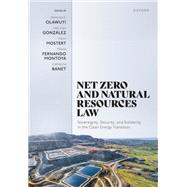
Net Zero and Natural Resources Law Sovereignty, Security, and Solidarity in the Clean Energy Transition
by Olawuyi, Damilola S.; González, José Juan; Mostert, Hanri; Montoya, Milton Fernando; Banet, Catherine-

This Item Qualifies for Free Shipping!*
*Excludes marketplace orders.
Buy New
Rent Textbook
Rent Digital
Used Textbook
We're Sorry
Sold Out
How Marketplace Works:
- This item is offered by an independent seller and not shipped from our warehouse
- Item details like edition and cover design may differ from our description; see seller's comments before ordering.
- Sellers much confirm and ship within two business days; otherwise, the order will be cancelled and refunded.
- Marketplace purchases cannot be returned to eCampus.com. Contact the seller directly for inquiries; if no response within two days, contact customer service.
- Additional shipping costs apply to Marketplace purchases. Review shipping costs at checkout.
Summary
By studying the legal and regulatory systems of Africa, Asia, Europe, Australasia, and North and South America through the themes of sovereignty, security and solidarity, Net Zero and Natural Resources Law provides an in-depth discussion of tools and techniques for addressing the legal and contract risks relating to the clean energy transition. This book offers a comprehensive and authoritative account of the nature, scope, and guiding principles of natural resources law and policy in a net zero era. Consideration is given to the integrated resource governance roadmap that is needed to improve coherence and coordination in the design, financing, and implementation of energy transition programs across the entire natural resource value chain.
Author Biography
José Juan González is a full law professor at the Metropolitan Autonomous University, Azcapotzalco, México and director of the Mexican Institute for Environmental Law Research, Mexico. He received his LLM in economic law from Metropolitan Autonomous University, Mexico, and his PhD in environmental law from the University of Alicante, Spain. He is chairman of the Mexican Institute for Environmental Law Research and director of the Mexican Environmental Law Journal. Professor Gonzalez is a fellow of the National Research System of the Mexican Council of Science and Technology, level III. He is a member of the Governing Council of the IUCN Academy of Environmental Law and the Academic Advisory Group of the International Bar Association's Energy, Environment, Natural Resources and Infrastructure Law section. He was the director of the legal division of the Attorney General's Office for Environmental Protection. In 1999, he drafted the Environmental Act of Mexico City, which is currently in force.
Hanri Mostert is a professor and principal of the DST/NRF SARChI Research Chair: Mineral Law in Africa, Department of Private Law, Faculty of Law, University of Cape Town, Cape Town, South Africa. Professor Mostert holds a doctorate degree in LL.D. in constitutional property law from the University of Stellenbosch where she also completed her LL.M. Degree. In 2023 she was inaugurated to the Academy of Science of South Africa and is also a member of the Academic Advisory Group within the International Bar Association's Section on Energy, Environment, Natural Resources and Infrastructure Law.
Milton Fernando Montoya is a lawyer from the Externado de Colombia University. He holds many roles including Partner at Holland & Knight; Director of the Mining and Energy Law Institute at Externado de Colombia University; Director of the Energy Transition Observatory; and President of the Latin American Mining Law Network. He is a member of the board of directors of the Regional Center for Energy Studies, the Mining, Petroleum and Energy Bar Association, and the Academic Advisory Group of the Energy, Environment, Natural Resources and Infrastructure Energy and Natural Resources Section of the International Bar Association. He is an honorary lecturer at the University of Dundee (Scotland), and guest professor at the University of Durham (England), the Pontifical Catholic University of Peru, and the University of Almería (Spain). He has served as legal advisor to the Colombian National Legal Defense Agency, the Colombian Ministry of Mines and Energy, and the Colombian National Mining Agency.
Catherine Banet (PhD) is a professor at the University of Oslo, Faculty of Law, Scandinavian Institute of Maritime Law, Energy and Resources Law Department, Norway. Her core fields of legal expertise include energy law, environmental law, competition law (particularly state aids), and EU/EEA law. She has a background in private law practice (Norway, France), the European Commission (DG ENV, Belgium), US diplomatic mission and academia. She is used as a lecturer at international universities and is a regular speaker at conferences. She is the author of several books, studies and articles. She is a consultant for national and international organisations, including the European Commission.
Table of Contents
An electronic version of this book is available through VitalSource.
This book is viewable on PC, Mac, iPhone, iPad, iPod Touch, and most smartphones.
By purchasing, you will be able to view this book online, as well as download it, for the chosen number of days.
Digital License
You are licensing a digital product for a set duration. Durations are set forth in the product description, with "Lifetime" typically meaning five (5) years of online access and permanent download to a supported device. All licenses are non-transferable.
More details can be found here.
A downloadable version of this book is available through the eCampus Reader or compatible Adobe readers.
Applications are available on iOS, Android, PC, Mac, and Windows Mobile platforms.
Please view the compatibility matrix prior to purchase.
